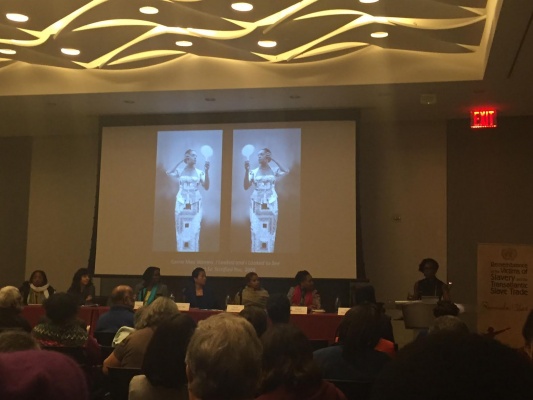Fordham and United Nations Host Event on Women, Creativity and Memory of Slavery
Fordham students attended a panel on Women, Creativity and Memory of Slavery (SRI STEWART/ THE OBSERVER)
October 15, 2015
In history books, the memory of slavery is often recalled through the words of men. On Oct. 5, The United Nations Remember Slavery Programme and Fordham University teamed up to host an event that aimed to give more perspectives from women at the Truth: Women, Creativity and Memory of Slavery roundtable discussion. The event, held at the Fordham School of Law, featured female scholars and artists sharing presentations on women’s creativity and their contribution in the recollection of slavery and struggle through different mediums of art. The event also reflects 2015’s theme—Women and Slavery—which is a part of the International Decade for People of African Descent (2015-2024).
The presenters included Yolanda Arroyo Pizarro, Nicole R. Fleetwood, Yuko Miki, Iyunolu Osagie, Gabriela Salgado, and Deborah Willis. These are women who are highly respected in their fields of scholarly work, artistic expression, and contribution to the dialogue of women in the African diaspora who have used their artistic voice.
One of the goals of the event was to help people understand and question: what can be learned from women’s experiences of slavery? Aimee Meredith Cox, cultural anthropologist and professor of African and African American Studies at Fordham University, was the moderator of the event. She related the past of women’s role in slavery and race relations to today’s slogan and activist movement of “Black Lives Matter.” The movement was actually co-founded by three women: Alicia Garza, Patrisse Cullors and Opal Tometi. An understanding of history, she explained, would help people to recognize that that the contribution of women of the African diaspora is the “artistry of a self-defined life.”
The first to present was Yuko Miki, a historian of the Iberian Atlantic World and assistant professor of Iberian Atlantic History at Fordham. Miki’s focus examines the ways slavery and freedom connected the lives of men and women in 19th-century Brazil with parts of the Atlantic, ranging from the Americas to Europe and Africa.
“Create memory as a shared experience,” Miki said. Then, people end up creating a global heritage. This is what people must do in regards to slavery—women are silenced in people’s general understanding of slavery and resistance, according to Miki.
Miki emphasized the importance of women’s resistance in subtle forms. She expressed her belief that they are just as important as any other uprising or revolt that is taught in history. In her research, she found that women aren’t too vulnerable to act in resistance.
“We expected them to be vulnerable, but we didn’t find them [in the historical data yet]. We had this expectation for women to not run away…But they have run away with children,” Miki said during the Q&A session.
Miki also revealed that in her research, she learned that women would make sure kids were not sold. Some tried to petition in court. Other women even gave birth alone after running away.
The presentation by Yolanda Arroyo Pizarro, a Puerto Rican novelist, poet, and short-story writer, had quite an effect on the audience. She expressed her concern and dissatisfaction for the fact that Puerto Rico lacks an African Studies or related college program in its universities—there is not enough dialogue on the experiences of African diaspora people and women on the island, according to Pizarro.
“The history of the hunt will always glorify the hunter until the lions tell the story,” Pizarro began in her presentation. Her book, “Negras: Stories of Puerto Rican Slave Women,” allows the voice of black women in Puerto Rico to be heard and acknowledged. Pizarro claimed the historical data is incomplete. There is a focus on rebellions by black male slaves, and the accounts are “narrated from a patriarchal standpoint.”
Pizarro ended her presentation by saying “Each victory must be applauded. Be a lion.”
In Iyunolu Osagie’s presentation, she is an associate professor of English at Pennsylvania State University, Osagie recalled her realization for the importance of a work by Barbara Chase-Riboud, a visual artist, novelist and poet of international high acclaim.
Chase-Riboud wrote “Echo of Lions” in 1989, a fictional novel about the real-life Amistad Revolt, which was a slave rebellion in which Mende people from Sierra Leone were kidnapped into slavery and successfully escaped to freedom. What stood out to Osagie was the “deliberateness” that Chase-Riboud did to place women in the historical event when records did not show there to be women involved.
“Women have always been there—if you look for them, you will find them,” Osagie said.
This event was also made possible when Fordham at Lincoln Center’s Senior Secretary Sandra Arnold, who launched the Burial Database Project of Enslaved African Americans, was invited to come to the global student conference on the transatlantic slave trade. From there, the collaboration with the UN and Fordham would continue for another two events on the topic of slavery. According to Arnold, the public education of slavery is vital to moving on to real progress and allows people to know and understand the history of their ancestors.












